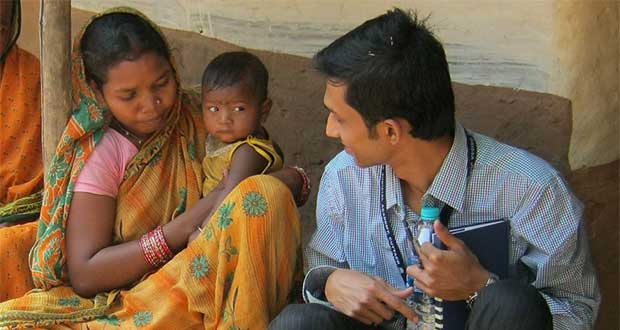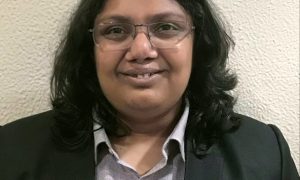Sudeep Kumar Das graduated from Hidayatullah National Law University in 2009, after which, he spent a year and a half working at Jindal Stainless Steel Ltd. However, he decided to quit his comfortable lifestyle and join the judiciary instead.
We have taken this opportunity to ask him about:
- His experience as a law student at Hidayatullah National Law University
- His time as an employee at Jindal Stainless Steel Ltd
- Tips on clearing the Odisha judicial entrance test
Tell us a bit about yourself.
I come from a middle class family. My father is a government servant and my mother is a home maker. I did my schooling from Bhubaneswar and went on to join HNLU after that. I am presently posted as Civil Judge-cum-Judicial Magistrate First Class, Koraput.
What were your ambitions before joining the law college?
Yes, I am a first generation lawyer in my family. For as long as I can remember, I wanted to be an IAS officer – mainly because my father was in the administrative services. In fact, I was never inclined towards law, until after my class 12 exams, when my father brought me law entrance exam forms to fill up.I wrote exams for NALSAR, Symbiosis, HNLU and GNLU. On the day of the Symbiosis exam, I was in Kolkata on holiday and my father sprang a surprise on me and handed me the admit card, I went ahead, took the exam, and cleared it – along with HNLU and GNLU. I joined HNLU at the age of sixteen and, even then, the only thing I wanted was to live the ‘law school’ life, make friends, and have fun – a far cry from any real inclination towards law. However, it was destined.
How was your college life?
My college life was beyond great! HNLU will always be the best thing to have happened to me. Students with different linguistic backgrounds, cultures, traditions and customs, gathered and shared their views and opinions. That, in many ways, shaped my life and broadened my horizons. For a boy from a small city, the experience of living away from home, and meeting and interacting with new people was a challenge. I was an average student. I was never into serious stuff in college. I always had the notion that college life involves enjoying and living life to the fullest. Even on the last day of HNLU, I never thought of entering into judiciary. Like many of us who study law, a decent job with good money was all I thought about. The realisation of an actual career came only after I joined the corporate sector.
When did you decide to get into judiciary?
During my law school career I had interned with almost all the top law firms like AMSS, Khaitan, Luthra & Luthra, JSA, S&R, Karanjawala etc. But I never wanted to be in law firms as I had to prepare for the civil services examination. So I joined Jindal Steel with a thought that working in a company would provide me time to prepare for the civil services. But this thought went out of the window, the day I got my first salary. I lost focus and was swayed. With good money coming your way and living in the capital city with your best friends, people generally lose their aim of life. But after a few months I realised this is not what I wanted to do my whole life. Life is much more than sitting behind a desk, doing some research and briefing advocates. Life is to create your own name however small it may be. Further, being in the company I was never going to give anything back to the society. I wanted that each day when I go to sleep, I could tell myself that today I did something satisfactory.
What motivated you most to be part of Orissa State judiciary?
Judiciary is one of the most respected and revered institutions of our country and the backbone of our democracy. I always wanted to serve the people. For me, judiciary and executive are the only institutions in this country where you directly come in contact with the society at large and deal with their problems. People demand justice. There is no better service than being a part of the justice delivery system and imparting justice to people. As the judicial exams are conducted by State Public Service Commission and I was not conversant with Hindi, which is a mandatory requirement for Judicial Service Exams in other states, I opted for Orissa Judiciary.
How did you remember the sections of the Acts in your syllabus and leading case laws on varied areas of law?
Firstly, the idea of doing well in the field of law has nothing to do with remembering the sections of Acts. The Judicial Services Exams test not your memory but your knowledge. For instance, the kind of questions we faced were:
Which article of the constitution includes the right to environment etc.?
(a) Article 19 (b) Article 21 (c) Article 51 (d) Article 48
Now, any person who has merely read the bare provisions will not be able to answer this, since the fundamental answer that the examiner is looking for is that the candidate is aware of Supreme Court’s interpretation of Article 21 to include the right to environment. People get confused, look into DPSP and fundamental duties, and get the answer wrong. The test is to determine an adequate knowledge of the constitution, which only comes by having a holistic view of constitutional law. Clarity of the basics overrides the need to memorise provisions. Case laws can be taken care of by reading commentaries and newspapers. Furthermore,the questions are generally regarding landmark cases, which every law school student is usually aware of.
How did you prepare for the exam?
Daily routine was not my cup of tea. So, I planned my preparation on a weekly basis and set deadlines to finish the syllabus.For the preliminary examination, bare acts are a must, but they won’t help if fundamentals are weak. I relied on Universal’s guide for preliminary examinations, as well. Also, note-making is one way to prepare for the main examination. They helped me greatly with quick revision. Good commentaries on each subject are essential for a basic understanding and for clarification of doubts. For example, for constitutional law, I referred to D.D.Basu. In fact, I found that the books we referred to in law school were enough to crack the exam.
Would you say an exam like this requires coaching classes?
No, not necessary at all.
How did you prepare yourself for the interview?
My interview was mostly on the subjects I opted for in the main examination like the Indian Penal Code, Contract Act, Torts, Negotiable Instruments Act etc. The interview board consisted of a Judge of the Hon’ble High Court and two members of the Orissa Public Service Commission. As for questions, I was asked about the difference between murder and culpable homicide not amounting to murder. The members asked about current affairs and recent Supreme Court decisions.
I would also like to highlight that in judicial examinations, the major focus is on the Criminal Procedure Code, Code of Civil Procedure and Evidence Act, as these are the provisions which a judge will be applying in day-to-day activities. However, in national law schools these subjects are not given due importance as most of the focus is on corporate law and intellectual property law.
In the interview session, one needs to be calm and focused. Even if the candidate does not know the answer,he/she should not panic. The interview is not to test your knowledge;that has already been done in the main examination. The interviewer wants to analyse whether you are fit to be a judge. Various practical situations will be put to you and your reaction to these situations will be the basis of your selection. For example, if an advocate in court makes irrelevant submissions in the court, what should be a judge’s reaction? A judge must have patience and needs to be composed. Furthermore, sudden reactions to submissions are not warranted from a judge. A judge needs to analyse law and all submissions – however irrelevant they may be – and pass a reasoned order.
Tell us about your time at Orissa Judicial Academy?
In law school, we learn the law, but in the academy, we learn the application of law in the justice delivery system. We are taught to write reasoned judgments, orders etc. The subordinate judiciary is where litigation begins. The root must be strong enough to hold the system. We are trained to record evidence of the witnesses and apply the procedures properly in day-to-day proceedings in consonance with the recent amendments and decisions of the Honourable Supreme Court and High Courts.
Do you feel the extent of training at Orissa Judicial Academy for giving decisions is adequate to meet the real world’s needs?
The training imparted at the judicial academy is adequate enough to meet the needs presently. Also, during training, we have interactions with judicial officers across India. The problems faced by judicial officers are discussed and the solutions are provided. The academy also provided special training on finger prints, brain mapping, counterfeit currencies, revenue laws etc., which are generally not taught in law schools. Also, we visited parts of Orissa to provide legal literacy to the people. This training helped us discharge our duty more efficiently. After all this, it has become clear to me why it is said that judges are “experts of the expert”.
After the training period, where was your first posting?
I was first posted as Judicial Magistrate First Class, Cuttack. Within months of my first posting, my court was declared as a Special Court to deal with Negotiable Instruments Act. That experience was immensely enriching. Moreover, there has been a lot of interpretation of provisions of the Negotiable Instruments Act recently by the Honourable Supreme Court. Therefore, one has to be equipped with knowledge of recent judgments and their application. As the negotiable instrument cases are compoundable, I convened many sittings with the complainants and the accused persons for amicable settlement of disputes and dispose of the same in the Lok Adalats.
How has your experience of being a judge been so far?
A judge’s day starts in court at 10:30 in the morning by going through various registers of the court and maintenance of the diary. A trial court in India has huge pendency of cases and lots of cases are posted each day. In the first hour of the court, the trial judges record the evidence of the witnesses, mark the exhibits etc. In the second hour, generally, we hear the bail matters and arguments. After that, we write judgments. As of experience, it is beyond description. While on the dais, one feels he is doing something for the people, for the country. A lot of people are deprived of their rights, and the judiciary is the last resort for every individual in this country. The faith of the people and the sanctity of this institution should not be compromised in any manner.
What do you think of the Indian judicial system?
The judicial system in the country is well-balanced and it has provided great judges to this country who have upheld the ideals of the Constitution. However, the infrastructure in the subordinate judiciary is not adequate and needs to be improved. Moreover, a higher budget allocation must be done by the government for the judiciary. Inadequate staff in the subordinate judiciary is also a major concern. Judiciary is one of the four pillars on which our democracy survives and the government needs to address its concerns. Secondly, the All India Judicial Service Exam must become a reality. The All India Judicial Service will foster national integration, improve the tone of judicial administration in the country, attract meritorious persons to judicial services and create confidence among them.
Given a chance to turn back the clock would you have done anything differently from what you’ve done in life?
A person would do different things given a chance, only if he has regrets about his past. I have no regrets. Every experience in life makes you a better and stronger person.
In the end, what advice would you give to judicial aspirants?
First of all, one should be honest about the reason for joining the services. Patience and perseverance will help in cracking the exam. In judicial services, you have a restricted life, and a large amount of time is spent in reading extensively, so make up your mind before opting for it.

























